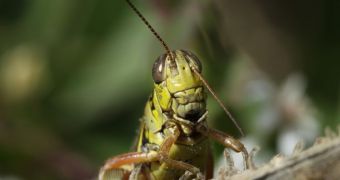According to the conclusions of a new study conducted by experts at the Yale University, it would appear that grasshoppers have the ability to change the patterns in which soils release carbon dioxide.
Interestingly, this happens only when spiders enter the picture, and start hunting the hopping insects. Scientists say that grasshoppers respond by shifting their diets from nitrogen-rich to carbohydrate-rich plants, affecting the way vegetation interacts with the soil.
This in turn leads to changes in the relationship between soils and the atmosphere, especially as far as emissions of the common greenhouse gas go. Details of the new study were published in this week's issue of the top journal Science.
When not stressed by predators, grasshoppers prefer to eat nitrogen-rich grass because the plant stimulates both their growth and reproduction rates. However, they change their diet to carbohydrate-rich grass as soon as they come under threat from predators. This is how they cope with stress.
This switch is not without repercussion. It sets in motion a dynamic chain of changes throughout the ecosystems that the grasshoppers occupy, which eventually lead to the release of larger amounts of CO2 into the atmosphere.
“Under stressful conditions they go to different parts of the 'grocery store' and choose different foods, changing the makeup of the plant community,” Oswald Schmitz explains. The expert, an ecologist at Yale, was a coauthor of the Science paper.
An interesting discovery is that the new diets tend to change the body chemistry of grasshoppers, making them decay slower after death, thus depriving soils of a significant source of fertilizer.
Uneaten plants decompose slower as well, with a similar result. “This study casts a new light on the importance of predation in natural communities,” says Saran Twombly. She holds an appointment as a program director in the US National Science Foundation's (NSF) Division of Environmental Biology.
“A clever suite of experiments shows that the dark hand of predation extends all the way from altering what prey eat to the nutrients their decomposing bodies contribute to soil,” the investigator adds.
The research group explains that the vast communities of microbes inhabiting soils need large amounts of nitrogen in order to produce the enzymes required to decompose organic matter. This is why plant decay rates decrease when grasshoppers switch to carbohydrate-rich diets.
“It only takes a slight change in the chemical composition of that animal biomass to fundamentally alter how much carbon dioxide the microbial pool is releasing to the atmosphere while it is decomposing plant organic matter,” Schmitz concludes.

 14 DAY TRIAL //
14 DAY TRIAL //